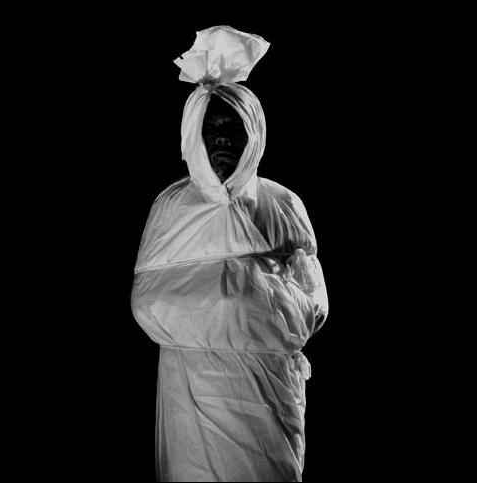
Pocong oath
Pocong oath is an oath made by a person in a state of the shroud swathed like a person who has died (pocong). This oath was rarely practiced by different procedures, for example, actors do not swear but only dikerudungi dipocongi shroud with a sitting position.
Oath pocong usually done by the adherents of Islam and is equipped with a witness and do in the house of worship (mosques). In Islamic law is not actually a vow to wear a shroud like this. This oath is a local tradition that is still thick to apply customary norms. Oath was conducted to prove the allegations or cases that have little or no evidence at all. Consequently, if the statement or promise not true, which is believed to have vowed punishment or curse from God.
In the Indonesian court system, is known as the oath sworn pulpit and is one of proof that is run by the courts in examining the case, civil case, although the form of oath pocong itself is not regulated in the Civil Law and Civil Procedure Code. Oath of the pulpit was born because of a dispute between a person as a plaintiff against another person as a defendant, usually a struggle for inheritance, land rights, debts, and so forth.
In a civil case there are some decent level of evidence presented, the first and second letter is evidence of the witness evidence. There are times when both parties hard to provide that evidence, such as about heritage, down-temurunnya property, or debts that the deceased parent made between the two sides a few decades ago. When this happens the third evidence is the evidence put forward conjecture by examining the series of events in the past. This evidence is somewhat prone to do. If the three kinds of evidence is still not enough for the judge to decide a case, the requested evidence of the recognition fourth. Given the location that most recently, the oath was to be the only tool to decide the dispute. So the oath was an immediate impact to the termination by the judge.
There are two kinds of Oaths Oath and Oath Suppletoir Decisoir. Supletoir oath or oath was made where there is additional evidence of the beginning but could not convince the true fact, it needs to be added oath. In a state with no evidence at all, the judge will give the oath or oath breaker decisoir that are thorough, complete the case.
By using the tool decisoir oath, the judge's decision will depend solely on the sound of oaths and vows courage speakers. In order to obtain the ultimate truth, because a decision based solely on the sound of the oath, the oath was associated with pocong oath. Oath pocong done to provide a psychological boost to the speakers oath not to lie.
In connection with the Almighty God swear the oath was called the dais. That is, those who bear the oath will be taken to face the pulpit houses of worship. Once set days to swear, perpetrators will be brought to the front of the pulpit house of worship that embraced religion. After purification, in front of the pulpit he would diupacarakan like someone died, accompanied by prayers.
Before a kyai and surrounded by the witnesses which consists of all assemblies, clerks, advocates, scholars, he was sworn into the formulation of a judge whose content justify a lawsuit or denial. After the ceremony will be made official by the clerk of court, tribunal, and the judge who witnessed, which explains everything about the implementation of the oath. Soon the news event that has been accepted by the court processed to make the decision. By proving using the pulpit is a bold pledge to take an oath is a win.

